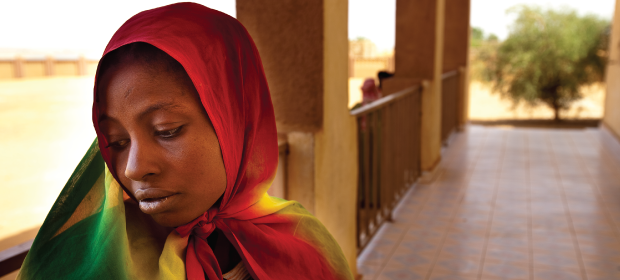Where We Work
See our interactive map


Pain. Loss. Loneliness.Too many women who suffer from obstetric fistula live these words every day.And although fistula is highly preventable and treatable, over 2 million women around the world continue to live with this childbirth injury and its devastating effects.That's why Louise Winstanly, chair of the board at IntraHealth International, has committed to changing that life for the women of Mali.Through the Clinton Global Initiative, she and IntraHealth will bring a new, holistic approach to fistula care in Mali.Soon, she hopes, there will be new words: Dignity. Prosperity. Well-being.But why fistula? And what makes this commitment special? Winstanly took a few moments to share her thoughts.VITAL: Why did you choose fistula as the topic for this new commitment?LW: The birth of a child should be an extremely joyous, happy occasion.But in cases of fistula, not only has the woman suffered a prolonged, excruciating labor, she has also most likely given birth to a stillborn child. So she’s dealing with both the emotional trauma of losing a child and the physical trauma of the birth.The lingering health effects are devastating—chronic incontinence, infections, possibly even kidney failure.
The surgical repair is not enough.
And then, through no fault of her own, she is often ostracized by her family and community because of her condition, and forced to live in isolation.Nicholas Kristof, a New York Times global health columnist, called these women the lepers of the twenty-first century. And he was right. Because even after a woman’s fistula is repaired, she may not be embraced again by her community.That is why reintegration and destigmatization through community engagement and advocacy are key parts of our commitment.VITAL: What’s different about this new commitment?LW: Right now, fistula in Mali is often treated as a purely surgical matter. But the surgical repair is not enough.We must also consider the social, psychological, and economic aspects that encapsulate a holistic approach, so that women affected by fistula have an opportunity to start new and meaningful lives.But how do you reintroduce yourself back into a community that has banished you? One way is by becoming something of an economic powerhouse.We’re very excited to foster entrepreneurial opportunities for women after their emotional and physical wounds have healed.By expanding our partnerships with local organizations, we intend to make targeted investments in economic empowerment, entrepreneurship training, and life skills for fistula survivors.The women, their families, and their whole communities will benefit.
Health workers have an enormous role to play in the lives of women with fistula.
VITAL: What role do health workers have to play?LW: Health workers are the unsung heroes of health care, and they have an enormous role to play in the lives of women with fistula.Health workers can educate entire communities about the dangers and health consequences of young girls giving birth.They have the ability to repair fistulas, to help women through the process, and to be advocates in their communities to prevent it from happening at all.Through our commitment, we’ll establish welcome centers in key health facilities, specifically for women with fistula. These centers will serve as havens for these women in the weeks before, during, and after their surgeries. They can rest assured that the health workers there will understand their specific health needs. And afterward, health workers can help women reintegrate into their communities and lead healthy, productive lives.VITAL: How will the Clinton Global Initiative help?LW: The Clinton Global Initiative provides a platform that will help us leverage IntraHealth’s longstanding leadership in global health and its robust network of partners to drive change for women suffering from fistula.By coordinating our efforts and collaborating for greater impact, we can change the way societies react to fistula—and the way they provide care for vulnerable women and families.IntraHealth’s partners in this CGI commitment include UNFPA/Mali, SamaHope, Direct Relief, Orange Mali Foundation, Inner Wheel Mali, and the Peter C. Alderman Foundation.Read more about IntraHealth’s Clinton Global Initiative Commitment to the women of Mali.
Get the latest updates from the blog and eNews




